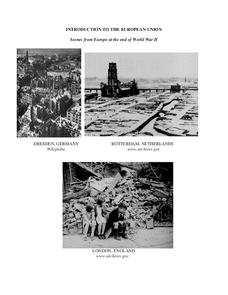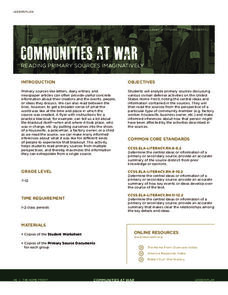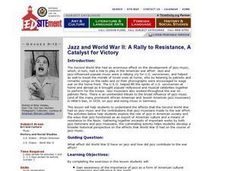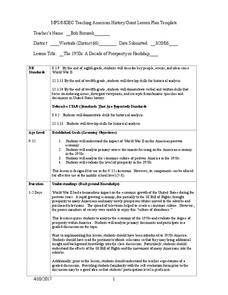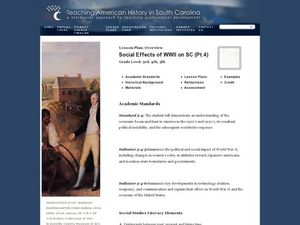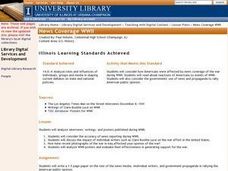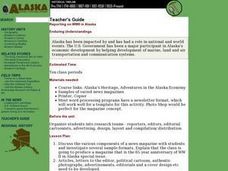NPR
Partners In Winning The War Lesson Plan
How propaganda was used to change the concept of women's roles during World War II is the focus of an online exhibit provided by the National Women's History Museum. Packed with propaganda posters and pictures, the packet points out how...
Curated OER
Introduction To The European Union
A lot happened to European economics, policy, and social systems after WWII. This 24 page social studies packet provides images, reading passages, comprehension questions, and critical thinking questions regarding all things Europe from...
National WWII Museum
Communities at War: Reading Primary Sources Imaginatively
Uncle Sam wants you to support the troops. Learners use an engaging lesson plan to analyze primary and secondary sources to discover what life was really like for American citizens at home during WWII. Pupils complete worksheets, group...
Curated OER
The Homefront: America and WWII
Students are introduced to the experiences of various groups of Americans at home during WWII, highlighting race, gender, and ethnicity. They improve their ability to analyze and interpret historical documents and images.
Scholastic
Dear Miss Breed
This compelling plan based on the letters in the book Dear Miss Breed engages readers in learning what it was like for Japanese Americans following the attacks at Pearl Harbor. After reading the letters, young scholars will partake in...
Rutgers University
African-Americans in WWII
Using transcripts of interviews of African-Americans who served in WWII, class members work in pairs to understand their experience. Prior to the group work, the teacher provides background on WWII and the African-American experience....
Curated OER
Jazz and World War II: A Rally to Resistance, A Catalyst for Victory
Students examine the impact of WWII on the development of jazz music and consider how jazz music helped to boost morale of both soldiers and those left at home. They identify the function of jazz as a cultural export and discuss its...
National WWII Museum
Dr. Seuss and WWII
What famous children's author and illustrator created World War II political cartoons featuring such subjects as fascism, the war effort, discrimination, and the dangers of isolationism? The who in this story is Dr. Seuss, and what...
Curated OER
World War II Laws
Students explore how laws passed during World War II have helped people with disabilities. In this social studies lesson, students research laws passed since World War II and complete a WWII Law chart.
Alabama Department of Archives and History
World War II Home Front - Mobilization in Alabama
Ships, tanks, and planes—what does a military need to fight a war? An interesting lesson explains the government's military mobilization efforts in Alabama during WWII. Class members look at a PowerPoint presentation and discuss how the...
Curated OER
American Economics after WWII
Students analyze the American culture after WWII. Through a variety of activities, students gain an understanding of ecomonics and prosperity in the US following WWII.
University of California
Roots of the Cold War
When and how did the Cold War begin? To answer this question, you will not find a better-organized, in-depth, activity- and inquiry-based resource than this! Executing best teaching practices throughout, each portion of this inquiry...
Curated OER
Hitler's Fatal Gamble
Students consider the differences between totalitarianism and democracy. In this comparative politics instructional activity, students will read a handout describing the major components that comprise totalitarianism and democracy,...
Rutgers University
How the Allies Won World War II: Island-hopping in the Central Pacific
Using primary source documents, young historians explore the strategies the US used to defeat Japan during WWII. They also learn about the American military experience, and innovations that changed the style of warfare. Young scholars...
Curated OER
Social Effects of WWII on South Carolina
Students study the history of South Carolina and the impact World War II had on the state. In this WWII history lesson, students research the social effects incurred from WWII on the people of South Carolina. Students develop an outline...
Curated OER
Social Effects of WWII
Fifth graders study the social effects of World War II on America. In this WWII effects instructional activity, 5th graders read paragraphs about the history of World War II. Students watch a video about the period and formulate...
Curated OER
News Coverage WWII
Students explore how Americans were affected by news coverage of World War II.
Curated OER
Images at War
Students examine American attitudes toward war as revealed in Civil War photographs and WWII homefront posters. They analyze and discuss photos, explore the National Archives website, and organize a statement of their findings.
Curated OER
Social Effects of WWII on SC
Fourth graders compare how the events in the Charleston Harbor affected South Carolinians versus people in other parts of the U.S. In this American history lesson, 4th graders watch a video clip, discuss sections of a book, and conduct...
Curated OER
WWII: The War Effort at Home
Young scholars explore the different ads used by the military. They use media reports and the internet to research the war effort at home during World War II.
Curated OER
A Look at Exclusion Through Improvisation
Building a realistic understanding of the trials Jews suffered during WWII isn't always easy. This plan employs student constructed dramatic freeze frame scenes to help build a deeper understanding of Jewish Ghettos, concentration camps,...
Curated OER
Major people and events of WWII
Twelfth graders research major people from WWII. They interview each person in their group, then create a newspaper which contains articles, advertisements and illustrations from the WWWII period.
Curated OER
Reporting on WWII in Alaska
Students explain the people and the political, geographic, economic, cultural, social, and environmental events that have shaped the history of the state, the United States, and the world.
Curated OER
"When They Came for Me, There Was No One Left to Speak Up" - Exploring Personal and Collective Responsibility in WWII
Students examine the underlying meaning of the phrase spoken by Pastor Martin Niemoller in 1945, "When they came for me, there was no one left to speak up." In this World History lesson, students share in a class discussion on civic and...



